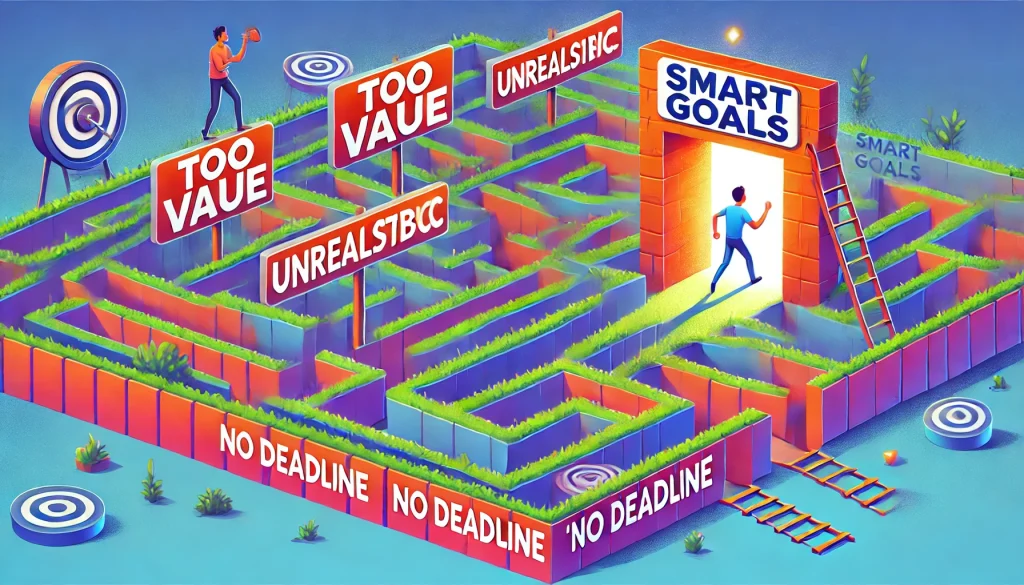Ever wonder why your New Year’s resolutions end up as distant memories by mid-February? It is not that you lack ambition—it is that your goals might lack structure. That is where SMART goals come in, a simple yet transformative method for turning your wildest dreams into achievable milestones. In this guide, I will show you how to create SMART goals and crush them every single time, with a dash of humor and practical tips to keep you engaged.
What Are SMART Goals?

SMART is an acronym that stands for:
- Specific: Clearly define what you want
- Measurable: Include criteria to measure progress
- Achievable: Make sure it is realistic
- Relevant: Align it with your bigger picture
- Time-bound: Set a deadline to create urgency
Think of SMART goals as the GPS for your dreams. Without them, you are wandering aimlessly, hoping to bump into success like a rom-com hero in a coffee shop.
Why Do SMART Goals Work?

The beauty of SMART goals lies in their practicality. Instead of vague aspirations like “I want to be healthy,” SMART goals force you to pin down specifics like, “I will work out three times a week for 30 minutes each to lose 10 kilograms in six months.” With this level of clarity, your goals become less of a fantasy and more of a plan.
How to Create SMART Goals

Be Specific
Unclear goals are the enemy of progress. Instead of saying, “I want to save money,” specify how much and why: “I will save $500 per month to build an emergency fund of $6,000 in a year.”
Pro Tip: Imagine you are explaining your goal to a curious 5-year-old. If they can understand it, you are on the right track.
Challenge Yourself: Write down your goal in one clear, concise sentence. Seriously, do it now.
Make It Measurable

Goals without measurements are like running a race with no finish line—confusing and exhausting. Decide how you will track progress. For instance, “I will lose 1 kilogram per week for the next 10 weeks.”
Pro Tip: Break your big goal into smaller, measurable milestones. Each win will feel like leveling up in a video game.
Your Mission: Set a measurable target for your goal. Keep it specific, and track your progress weekly.
Keep It Achievable

Ambition is great, but unrealistic goals are motivation killers. If you are currently binge-watching Netflix for six hours a day, setting a goal to run a marathon in a month is setting yourself up for failure.
Pro Tip: Aim for a “Goldilocks Goal”—not too easy, not too hard, but just right.
Take Action: Ask yourself, “Is this goal realistically achievable within my current resources and time frame?” Adjust if needed.
Ensure It Is Relevant

Your goals should align with your broader aspirations and values. Ask yourself, “Why does this matter to me?” If your goal is to learn French, but you do not care about visiting France or eating croissants, you might need to rethink it.
Pro Tip: Relevance keeps you emotionally invested in your goal. The stronger the connection, the more likely you are to stick with it.
Connect the Dots: Link your goal to your “why.” Write down how achieving it will improve your life.
Make It Time-Bound

Deadlines create urgency, and urgency creates action. Saying, “I will write a book someday” is vague. Instead, commit to, “I will write 1,000 words per week to finish my book in six months.”
Pro Tip: Set mini-deadlines within your bigger goal to keep momentum going.
Mark Your Calendar: Give your goal a specific deadline. Circle the date on your calendar and stick to it!
Common Mistakes to Avoid When Setting SMART Goals

Being Too Vague
Your goal should answer who, what, where, when, and why. Ambiguity is the kryptonite of progress.
Setting Unrealistic Goals
Dream big, but stay grounded in reality. Aim for progress, not perfection.
Neglecting a Support System
Do not go at it alone. Share your goals with friends, mentors, or even an accountability app.
Skipping Regular Check-Ins
Review your progress weekly. Think of it as a date with your future self.
Action Plan: Review your SMART goal weekly. Are you on track? If not, adjust and refocus.
Examples of SMART Goals

Personal Development
“I will read one self-improvement book every month to boost my knowledge and skills by the end of the year.”
Fitness
“I will complete 10,000 steps daily to improve my fitness levels over the next 90 days.”
Career
“I will complete a professional certification in digital marketing within six months to enhance my career prospects.”
Your Turn: Take one of these examples and adapt it to your personal aspirations.
How to Stay Motivated
Celebrate Small Wins

Each milestone reached is a reason to celebrate. Treat yourself (responsibly) to keep the motivation alive.
Visualize Success
Imagine how great it will feel to accomplish your goal. This mental practice can help you push through challenges.
Find an Accountability Partner
Share your goals with someone who will check in on your progress. It is harder to slack off when someone is rooting for you.
Get Started: Partner up! Find someone who shares your drive and keep each other accountable.
Conclusion
SMART goals are not just a productivity hack—they are a life hack. By being Specific, Measurable, Achievable, Relevant, and Time-Bound, you can turn dreams into plans and plans into reality. So, grab a notebook, start jotting down your SMART goals, and remember: progress beats perfection every time.
Next Step: Start your first SMART goal today! Share it with someone who can cheer you on. Success loves company!

Leave a Reply